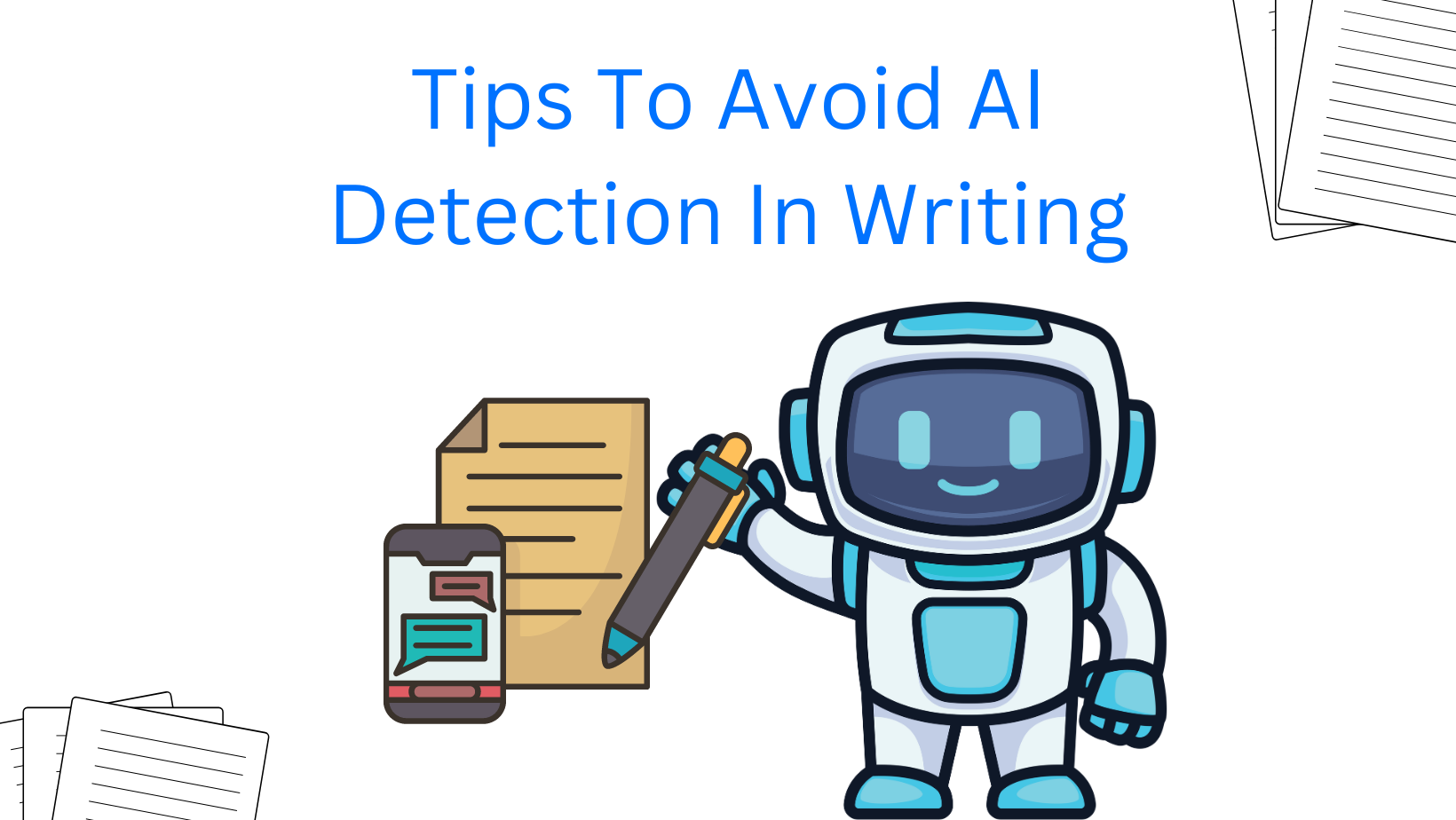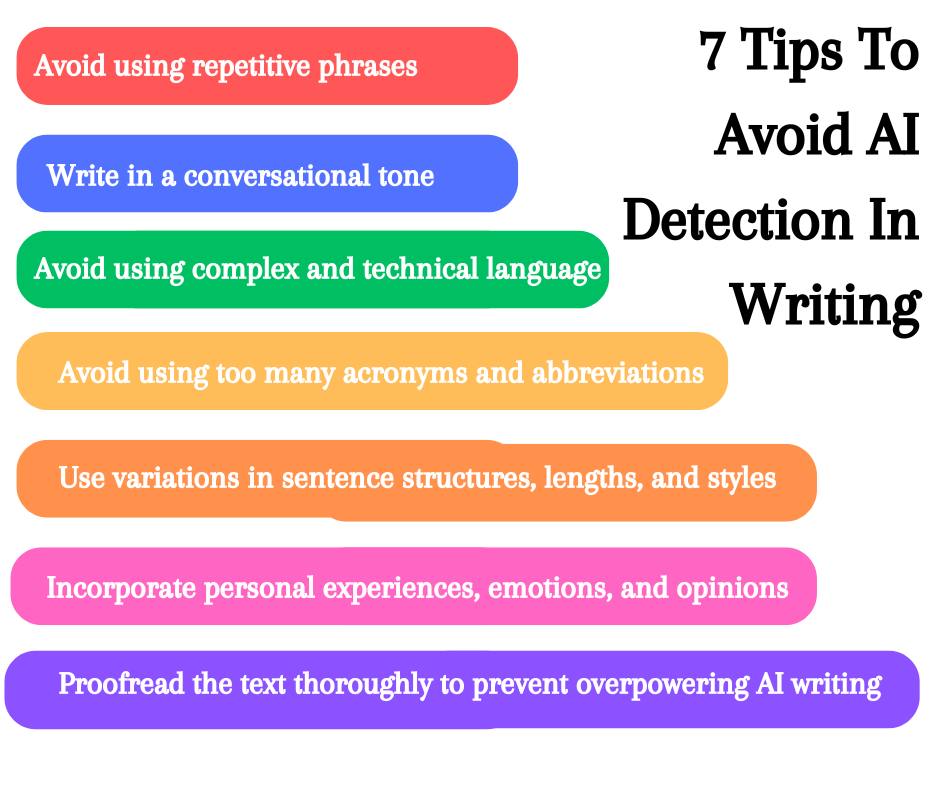As we all know, AI-generated content has become increasingly prevalent in today’s digital landscape. While this technology has revolutionized the way we produce and consume information, it has also raised concerns about the authenticity and quality of the content being created.
To address these concerns, advanced technologies are being used to detect AI in writing and protect users from potentially harmful content.
However, these detection mechanisms can sometimes penalize genuine content as AI-generated, which can hinder the freedom of expression and limit the ability to convey messages to the intended audience.
That’s why it’s important to understand the tips and techniques for avoiding AI detection in writing, allowing for creative freedom and effective communication.

Page Contents:
7 Tips To Avoid AI Detection In Writing
You can Avoid AI Detection In Writing simply by being extra careful and avoiding writing for robots. AI writing cannot match human talent.
Hence make sure you sprinkle the magical dust of human creativity to avoid AI detection in your writing. Moreover, the following 7 tips will help you avoid AI detection in writing.
1. Avoid using complex and technical language that is commonly used by AI-powered assistants.
When you are writing something, it is important to keep in mind the audience you are writing for. If you are writing for the general public, it is best to avoid using complex and technical language. Instead, you should aim to frame your writing in a way that is easy to understand for the average person.
Using simple language and easy words ensures that your message is clear and accessible to as many people as possible. This will make your writing more effective and help you to connect with your audience in a meaningful way.
2. Write in a conversational tone that is natural and free-flowing.
It is a known fact that conversational content tends to attract more views and engagement. If you want to create such content, it’s important to make your users feel like they are having a one-on-one conversation with a person, rather than with an AI-powered assistant.
The key to achieving this is to create content that feels natural and free-flowing, with a tone that is relatable and easy to understand. While AI writing has come a long way, one of its limitations is that it can sometimes lack the nuances of human language and tone, which can make it easier to detect.
By focusing on creating content that is authentic and relatable, you can avoid any potential pitfalls and create engaging content that resonates with your audience.

3. Avoid using repetitive phrases and patterns that may indicate the text is generated by a machine.
It is important to note that using repetitive phrases in your writing can lead to a monotonous and uninteresting piece of content. This is particularly noticeable in AI-generated writing, where certain terms and phrases are repeated in a predictable pattern.
This can be detected by AI detectors and may lead readers to believe that the text they are reading is generated by a machine rather than a human.
To avoid this, it is advisable not to use repetitive phrases and patterns that may indicate that the text is generated by an AI-powered assistant. Instead, try to vary the language and structure of your writing to keep it engaging and interesting for your readers.
4. Use variations in sentence structures, lengths, and styles to make the text appear unique and human-like. you
Human-crafted content is often characterized by its fluctuating tones, structures, and styles. These variations in writing enhance the uniqueness of the content and keep the reader engaged throughout the reading process.
AI writers, on the other hand, may not always understand the nuances of language and human demand, making it difficult for them to adapt and play with sentence structures and lengths in the same way that humans can.
As a result, they may struggle to achieve the same level of engagement and interest that human-crafted content can achieve. these modifications in sentence structure and length will help you prevent AI detection in writing.
5. Avoid using too many acronyms and abbreviations, which are commonly used in machine-generated text.
To ensure that the text you generate is easily understandable and accessible to a wider audience, it is best to avoid using too many acronyms and abbreviations.
While these may be commonly used in AI-generated text, they can often lead to confusion or misunderstandings when read by humans who may not be familiar with the specific terms that are associated with these abbreviations.
Therefore, it is generally recommended to use complete words or phrases instead of relying heavily on acronyms and abbreviations in your text.
6. Incorporate personal experiences, emotions, and opinions to add a human touch to the writing.
When creating content, it’s important to incorporate personal experiences, emotions, and opinions to add a human touch to the text. By sharing your unique perspective, you can create a more engaging and relatable piece of writing that resonates with your audience.
Including personal insights can help to connect with readers on a deeper level and make your writing more memorable. this is however hardly possible with AI content.
7. Proofread the text thoroughly to prevent overpowering AI writing
To prevent AI Detection In Writing and to ensure that your written communication is clear and professional, it’s important to proofread your text thoroughly. This involves reviewing your writing for repetitive phrases, complex languages, and modification in writing styles.
By taking the time to carefully review your work, you can catch any errors and make the necessary changes to ensure that your message is error-free and grammatically correct.
This can help you to convey your ideas more effectively, build your credibility, and avoid misunderstandings that could impact your reputation or relationships.